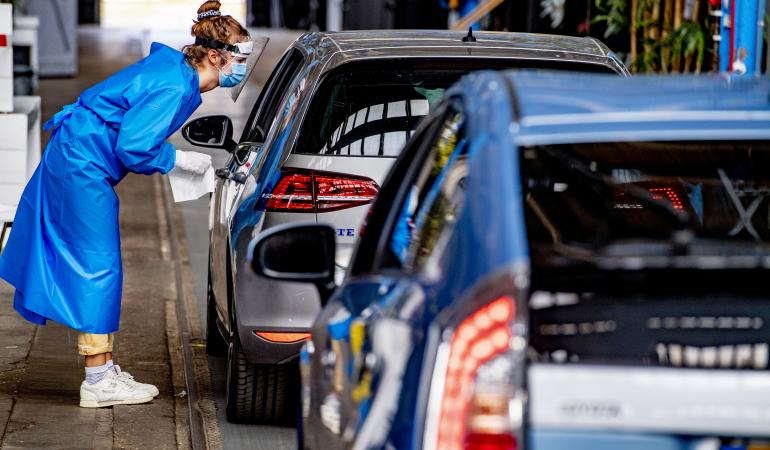
The Dutch policy of staying home and getting tested if you have corona-related symptoms can count on support from the majority of the over 50,000 participants in RIVM’s behavioural study. However, if people actually develop symptoms, 80% say they went outside anyway, and only 12% say they got tested. 4 out of 10 people attribute their symptoms to a health condition other than COVID-19, such as hay fever, and state this as the reason why they do not get tested. This was clear from research conducted by RIVM and the regional public health services (GGD).
Staying home in case of symptoms is crucial
The first clusters have been identified through source and contact tracing and the number of infections seems to be slowly increasing again. RIVM is concerned that people are not staying home if they have symptoms that could indicate COVID-19. In this survey, 40% indicated that they went to work even if they had symptoms, and over 80% said they did their shopping. Almost half of the participants with symptoms stated that they felt it was difficult or very difficult to comply with this recommendation in practice.
Testing is important for early detection
RIVM stresses that a crucial part of controlling this outbreak is ensuring that people with symptoms stay home. Although testing has been possible at over 80 GGD test lanes since 1 June, 30% of survey participants with symptoms indicated that it was difficult or very difficult for them to comply with the recommendation to get tested. It is also not clear to everyone that the recommendation is to get tested immediately in case of even one symptom, or only mild symptoms. People are accustomed to not going to the doctor right away if they have mild health symptoms, opting to “wait and see”.
When are the symptoms relevant?
People regularly attribute their symptoms to such things as asthma, hay fever, or a persistent cold that they frequently have. If someone clearly recognises that their symptoms are the usual symptoms caused by their hay fever or smoker’s cough, testing is not necessary. However, if someone has symptoms other than their usual symptoms, even if they are mild: stay home and get tested immediately.
Encouraging people to stay home and get tested
People who do get tested say that they are doing so to be sure, because they want to protect others, or because they want to be able to go to work. To encourage people to stay home and get tested, it could be helpful to make this as easy as possible: for example, to be able to get tested quickly at a location nearby, and to offer support during home isolation. Finally, people are more likely to comply with the recommendations if they see them as useful, and can clearly see the benefit of staying home and getting tested. For example, it could help to state that over 500 people tested positive just within the last week, and that those test results probably helped to prevent about 3000 infections in the next six months.
Widespread monitoring
The information from the behavioural research should be seen in a broader perspective of comprehensive monitoring. RIVM remains alert to the various indicators, which collectively offer an overall impression of how the coronavirus is spreading within the Netherlands. If one indicator raises a flag, it is not necessarily cause for concern. However, it is important to understand the cause, so policy can be adjusted accordingly.
Over the past few months, we have worked together and managed to significantly reduce the spread of the novel coronavirus. That is also reflected in the low percentage of positive tests. It is now important for everyone to keep helping to prevent the spread of the virus: Stay home if you have symptoms, get tested, stay 1.5 metres apart, wash your hands frequently, and avoid crowds.
The figures come from the behavioural study conducted by RIVM, GGD-GHOR and the regional public health services (GGDs). The underlying explanations come from in-depth interviews. These results have been incorporated into an integral analysis. The study was funded by the Netherlands Organisation for Scientific Research (NWO) and the Netherlands Organisation for Health Research and Development (ZonMw).